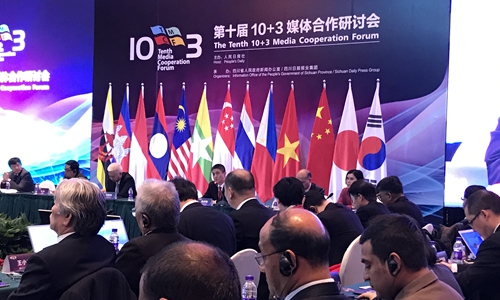
Delegates attend the 10th 10+3 Media Cooperation Forum in Chengdu, Southwest China's Sichuian Province, on December 15, 2019. (Photo: Global Times)
Media delegates from China, Japan, South Korea and ASEAN members (10+3) gathered in Chengdu, Southwest China's Sichuan Province, on Sunday to discuss how to build a prosperous Asia via opening-up and inclusiveness.
Some 150 delegates from 60 mainstream news outlets from 10+3 framework and six South Asian countries, as well as the China-Japan-South Korea Trilateral Cooperation Secretariat, attended a forum organized by the People's Daily.
Amid major changes in the world that are unseen in the past century, attendees expressed a shared interest in China's development, how to improve mutual trust and cooperation, and how to build a prosperous Asia.
Fang Jiangshan, a deputy editor-in-chief of the People's Daily, delivered a speech at the 10th 10+3 Media Cooperation Forum, saying that China has been developing with an open door and upholds an inclusive attitude in international exchanges.
China insists on all-round opening-up, shares development opportunities with the world and promotes an open world economy, he said.
Fang underlined that the China-initiated Belt and Road Initiative (BRI) serves as an important platform to build a community with a shared future for mankind.
BRI has broadened the space for Asian countries to achieve win-win cooperation and injected development impetus for global prosperity, Fang said.
Cao Jing, a deputy secretary-general of the Trilateral Cooperation Secretariat, noted how the achievements via the 10+3 framework should be cherished amid major changes in the world.
Cao said that given the large number of developing countries in Asia and the uneven and inadequate development, China, Japan and South Korea are committed to sharing experiences and technologies through the China-Japan-ROK + X model to help build a sustainable economy by enhancing economic growth, ecological protection, disaster reduction and poverty alleviation.
Lee Huay Leng, head of Singapore Press Holdings' Chinese Media Group, noted that while all identified themselves as Asian based on geographical characteristics, Asian countries must also recognize the existing differences. Mutual trust should be built based on that recognition, she said.
Ko Ko, chairman of Yangon Media Group from Myanmar, called for global governance to handle the shared challenges and enjoy the shared opportunities.
He lauded China's leading role in the reform of global governance to guarantee peace and prosperity in the region and the world, citing BRI and the Asian Infrastructure Investment Bank as examples.
Sridhar Venkataraman from India's Frontline magazine said during round-table discussions that China's development and role after the 2008 economic crisis is important as it provides hope and more possibilities to other developing countries.
A media dialogue between China, Japan and South Korea was also held Sunday morning to discuss cultural cooperation in East Asia.
Media personnel from 23 organizations in the three countries and cultural celebrities attended the meeting and exchanged their insights on cultural cooperation and relics protection.
When addressing the meeting, Fang noted the shared cultural roots and solid economic ties that created the conditions for cultural cooperation among the three countries.


